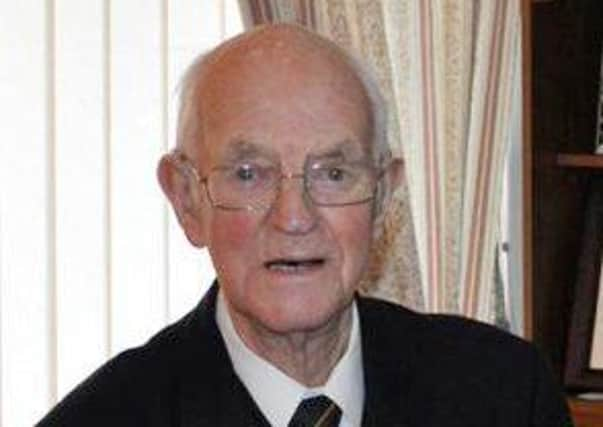Obituary: John Andrew McGhee, Royal Marine & D-Day veteran


By the end of 11 June, 1944 – D-Day plus five – a staggering 326,547 troops, more than 54,000 vehicles and 104,000 tons of supplies had been landed on the beaches of Normandy.
Among the 61,715 British troops who had made the historic amphibious assault on Sword Beach days earlier was Royal Marine John McGhee, a young Fifer just out of his teens.
Advertisement
Hide AdAdvertisement
Hide AdHe had already seen action in North Africa and Sicily – both difficult campaigns – but the invasion force battling the elements and the enemy on the French coast that June morning was like nothing he had previously experienced.
The landings began at 7:26am. McGhee was in LCG 680, a landing craft gun vessel adapted to tow rockets behind the craft.
The weather was dreadful, wet and windy, and the foe was putting up a tremendous fight but he knew it was vital to consolidate their position and protect the flank to allow the successful invasions of Juno and Gold beaches along the coast.
“It was all about getting a foothold. We lost a lot of men and things were so bad at one time the decision was taken not to unload any more men or equipment through the ferocity of the fire from the Germans,” said McGhee who patrolled Sword beach and the coast near Le Havre hunting for German pocket submarines.
But just over an hour after the landings started the enemy had been cleared from three beach exits. An airborne invasion forced had already landed in the early hours and seized Pegasus Bridge. By lunchtime 1st Special Service Brigade had linked up with the airborne division there and the nearby town of Bénouville was theirs by 8pm.
The events of that momentous day were captured in the epic 1962 film, The Longest Day, which featured several actors who had served during the Second World War, including Richard Todd, one of the first British officers to land in Normandy on 6 June.
“It was certainly a very long day down on Sword Beach,” acknowledged McGhee, “but the foothold was achieved and the following day we were able to connect with our forces on the other beaches. It was a day you could never forget”.
John Andrew McGhee, the son of a coalminer who later worked at Rosyth Dockyard, was born in Cowdenbeath, though he liked to claim his birthplace was the USA – upstairs in an attic.
Advertisement
Hide AdAdvertisement
Hide AdEducated at the town’s Foulford and Old Beath High Schools, he went on to work with a local butcher and at the age of 18 found himself serving his country.
He trained as a Royal Marine at Chatham Barracks in Kent before sailing on the warship HMS Nelson to Gibraltar. From there they made their way along the North African coast, to Algiers and Dijelli, a spot formerly occupied by German troops and which the British took over as a base. After exercises involving Landing Craft Guns and Landing Craft Flack vessels, they headed for Malta.
His next major campaign was Operation Husky, the invasion of Sicily – an assault that caught the Germans spectacularly off-guard. In one of the most intriguing examples of wartime subterfuge British spymasters had dumped a corpse at sea along with fake military plans for an invasion of Sardinia and Greece.
The ruse, codenamed Operation Mincemeat, resulted in the body and documents being retrieved by the enemy with Hitler diverting troops to see off the fictitious attack.
As part of the hoax McGhee’s ship overshot Sicily at dusk, in the pretence of heading for Greece, but turned back during the night to take part in the assault on the Sicily in July 1943. It was the start of the attack on German-occupied Europe and a precursor to D-Day.
After Italy, he returned to Cardiff and then on to Belfast for repairs before sailing north to Govan docks for more repair work.
Then he was on his way to Normandy where, after a successful mission to defend Sword Beach, the marines enjoyed a rest from the fighting at the newly-liberated Luc-Sur-Mer.
He was back on the Clyde later that year but left for the Far East at Christmas 1944, sailing from Wemyss Bay in the snow. He served in India and Burma and was present at the relief of Singapore, the British colony that had fallen to the Japanese in 1942.
Advertisement
Hide AdAdvertisement
Hide AdDemobbed in 1946, he returned to the butchery trade and worked in various butchers over the years. He had already met his future wife Jemima, at a dance in the Co-operative Hall in Cowdenbeath, while on leave and they married in October 1947.
He retired at 71 but continued to keep busy, helping out at a Cowdenbeath butchers. He had also thrown himself into serving the local community and was a staunch member of Cowdenbeath Community Council which awarded him its Citizen of the Year accolade. Politically he was an avid SNP supporter and was lauded as the 600th member to join the party locally.
He was also instrumental in establishing a Second World War memorial at the old town house in Cowdenbeath and was heavily involved, as both secretary and chairman, in the Normandy Veterans’ Association Fife branch, now dissolved through lack of members.
Three years ago he was a guest of honour at a Fife Council civic reception and proudly unveiled a plaque commemorating those from the area lost during the Second World War.
And this January, at a ceremony in Edinburgh Castle, he was one of nine Scottish Normandy veterans honoured with France’s higher order, the Legion d’Honneur – an award he promptly handed to his eight-year-old great grandson.
One of the final few hundred British Normandy veterans left and Cowdenbeath’s last D-Day hero, he is survived by his wife, known as Mina, son Robert, grandson Scott and great-grandchildren Lucy and Ewan.
ALISON SHAW